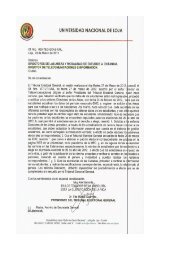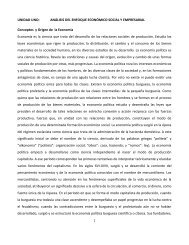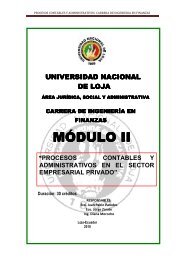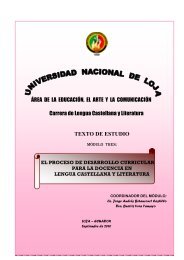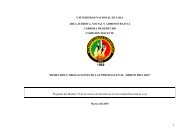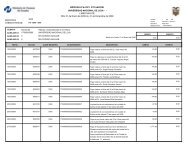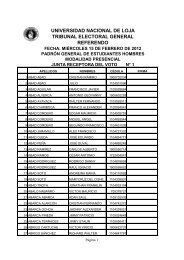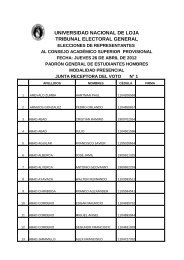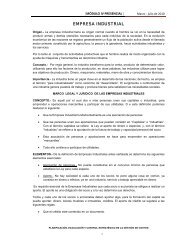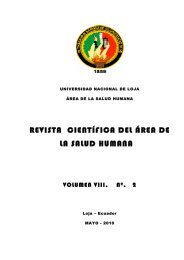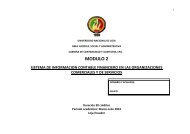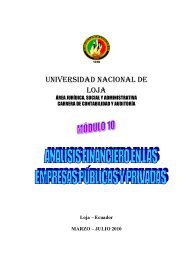module 5 planning of the english language teaching-learning process
module 5 planning of the english language teaching-learning process
module 5 planning of the english language teaching-learning process
Create successful ePaper yourself
Turn your PDF publications into a flip-book with our unique Google optimized e-Paper software.
UNIVERSIDAD NACIONAL DE LOJA<br />
Área de la Educación el Arte y la Comunicación<br />
English Language Career<br />
Teacher roles<br />
CLASSROOM MANAGEMENT<br />
What are teacher roles?<br />
During a lesson <strong>the</strong> teacher needs to manage <strong>the</strong> activities and <strong>the</strong> learners in<br />
<strong>the</strong> classroom in different ways. This means he or she needs to behave in<br />
different ways at different stages <strong>of</strong> <strong>the</strong> lesson. These different kinds <strong>of</strong><br />
behaviour are called 'teacher roles'.<br />
Key concepts<br />
Which roles does a teacher use in a lesson?<br />
Every teacher changes roles during a lesson. These roles will be appropriate to<br />
<strong>the</strong> type <strong>of</strong> lesson, activities, lesson aims and <strong>the</strong> level and age <strong>of</strong> <strong>the</strong> learners.<br />
At different times we may, for example, act as a planner, an informer, a<br />
manager, a parent or friend, or a monitor. For example, when learners are<br />
doing a role-play, one role we have is to make sure that <strong>the</strong>y are doing what<br />
we want <strong>the</strong>m to do. This is called monitoring. When we present new <strong>language</strong><br />
to <strong>the</strong> class, our role is to inform and explain to our learners. Here are some<br />
roles teachers <strong>of</strong>ten use.<br />
Role<br />
The teacher:<br />
1 Planner prepares and thinks through <strong>the</strong> lesson in detail before <strong>teaching</strong> it so<br />
that it has variety and <strong>the</strong>re are appropriate activities for <strong>the</strong> different<br />
learners in <strong>the</strong> class.<br />
2 Informer gives <strong>the</strong> learners detailed information about <strong>the</strong> <strong>language</strong> or about an<br />
activity.<br />
3 Manager organises <strong>the</strong> <strong>learning</strong> space, makes sure everything in <strong>the</strong> classroom is<br />
running smoothly and sets up rules and routines (i.e. things which are<br />
done regularly) for behaviour.<br />
4 Monitor goes around <strong>the</strong> class during individual, pair and group work activities,<br />
checking <strong>learning</strong>.<br />
5 Involver makes sure all <strong>the</strong> learners are taking part in <strong>the</strong> activities.<br />
6 Parent/Friend comforts learners when <strong>the</strong>y are upset or unhappy.<br />
7 Diagnostician is able to recognise <strong>the</strong> cause <strong>of</strong> learners' difficulties.<br />
8 Resource can be used by <strong>the</strong> learners for help and advice.<br />
There are certain roles that we usually use at certain stages <strong>of</strong> <strong>the</strong> lesson. For<br />
example, we are planners before <strong>the</strong> lesson and may be monitors during group<br />
work and pairwork activities. Sometimes we take on more than one role at <strong>the</strong><br />
same time. For example, we might monitor and explain if a pair <strong>of</strong> learners is<br />
having problems with an activity: we monitor to see how well <strong>the</strong>y are doing and<br />
we explain to help <strong>the</strong>m do better. There are various names for <strong>the</strong> different<br />
roles <strong>of</strong> <strong>the</strong> teacher. The ones above are very common.<br />
<br />
Key concepts and <strong>the</strong> <strong>language</strong> <strong>teaching</strong> classroom<br />
[Escribir texto] Página 101



